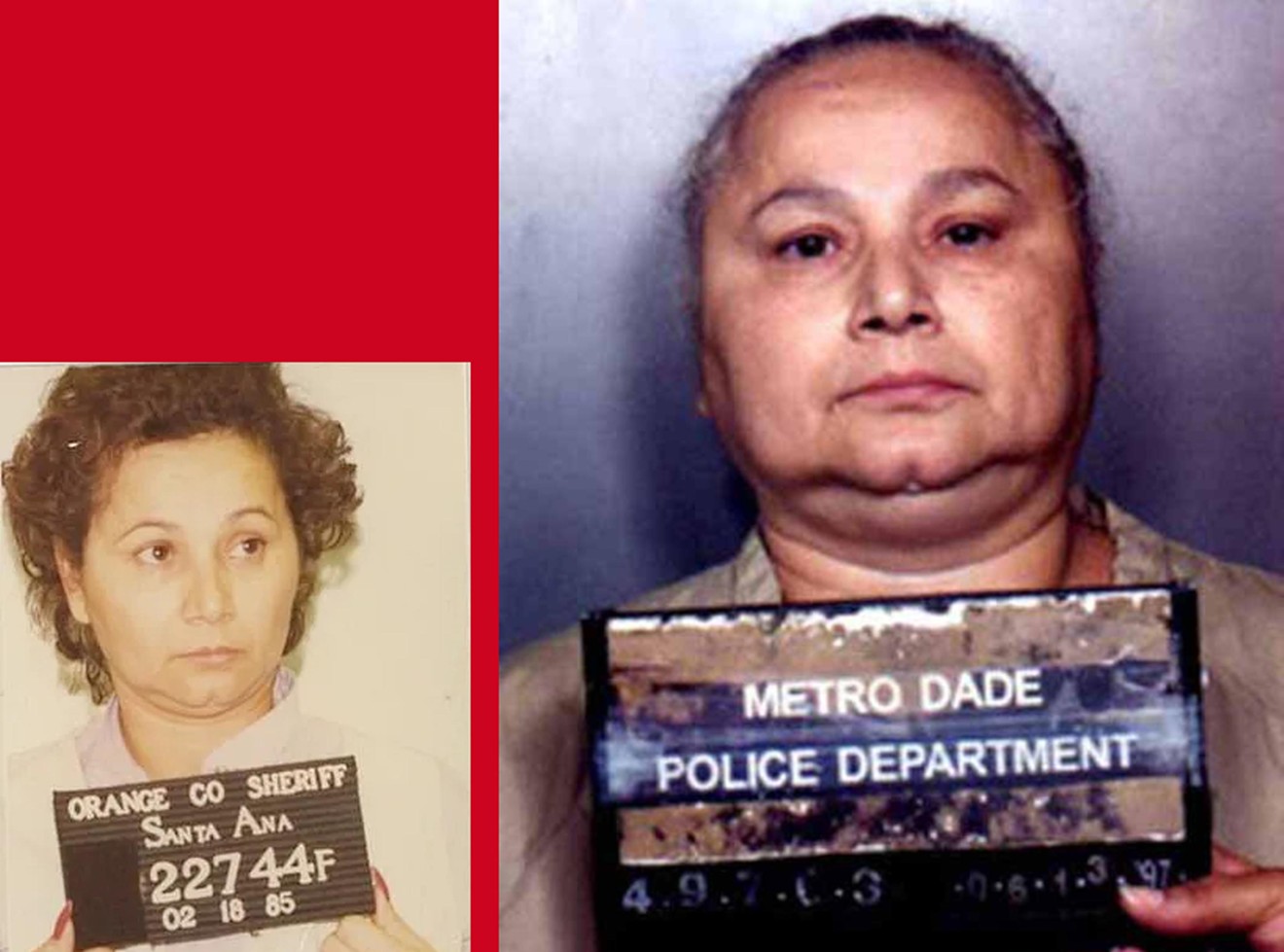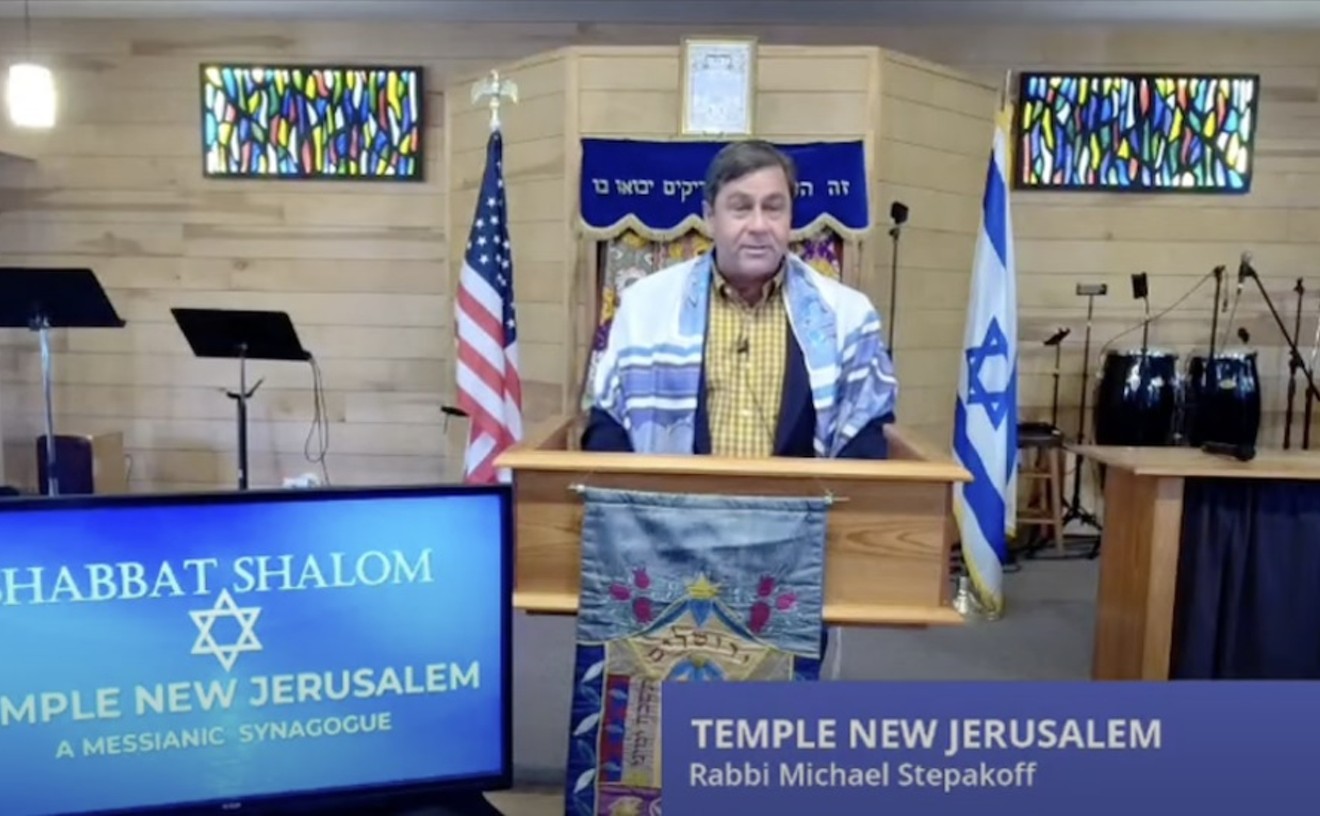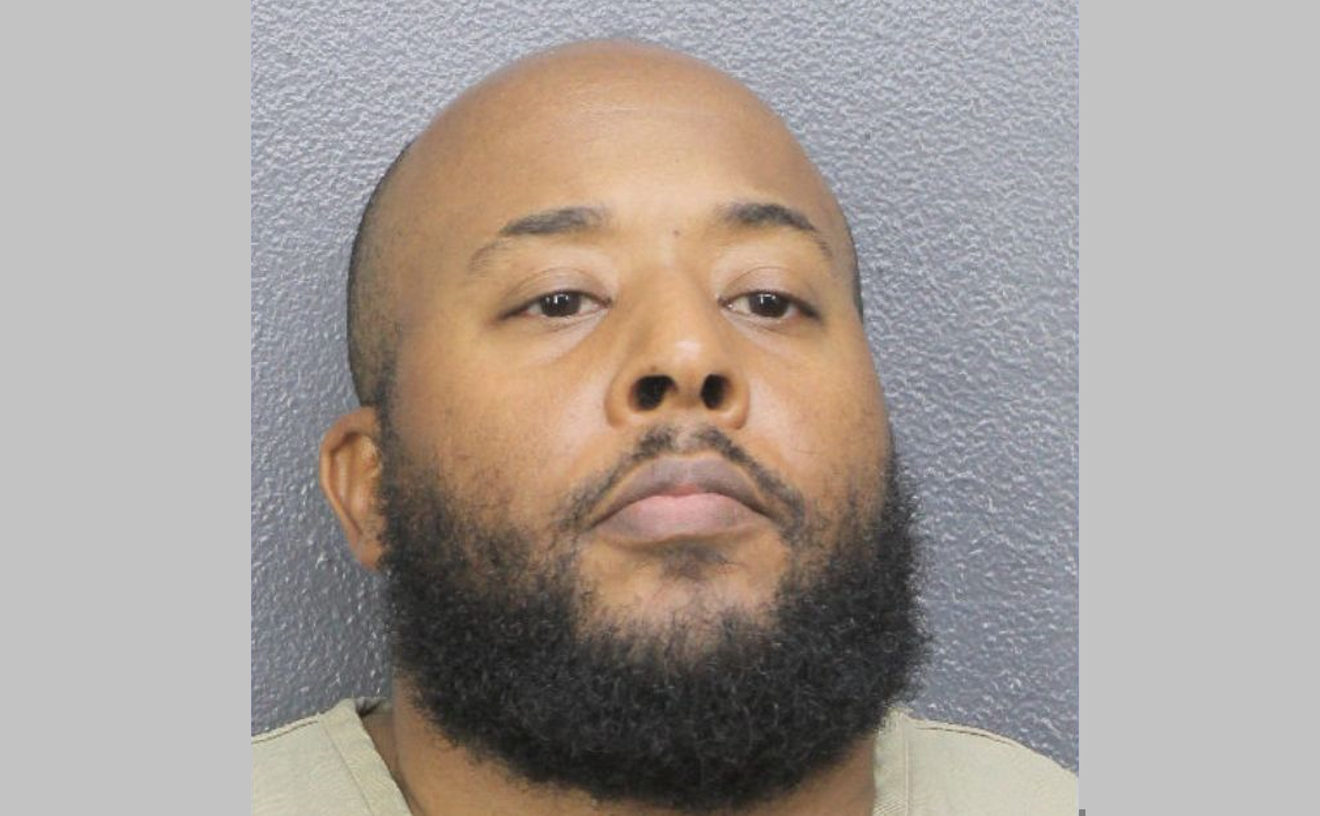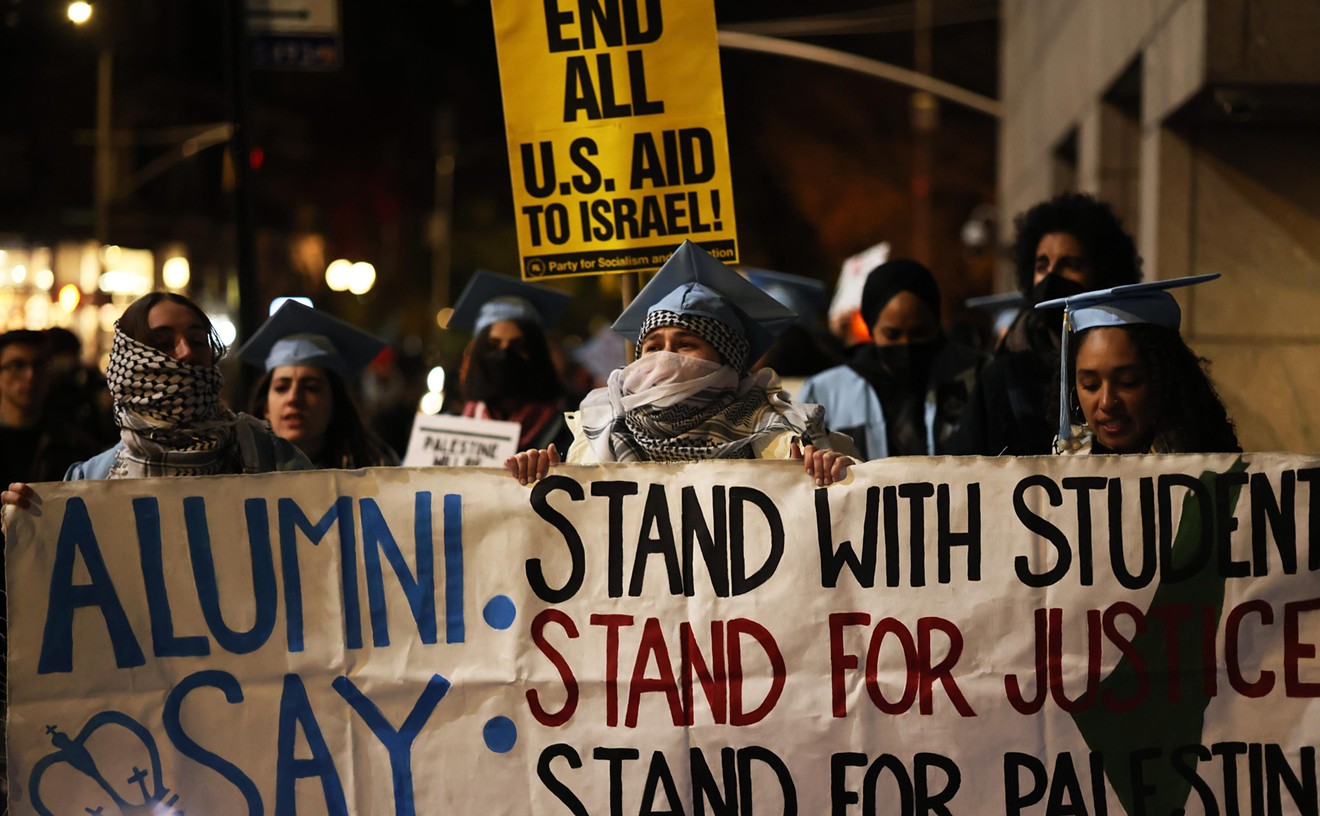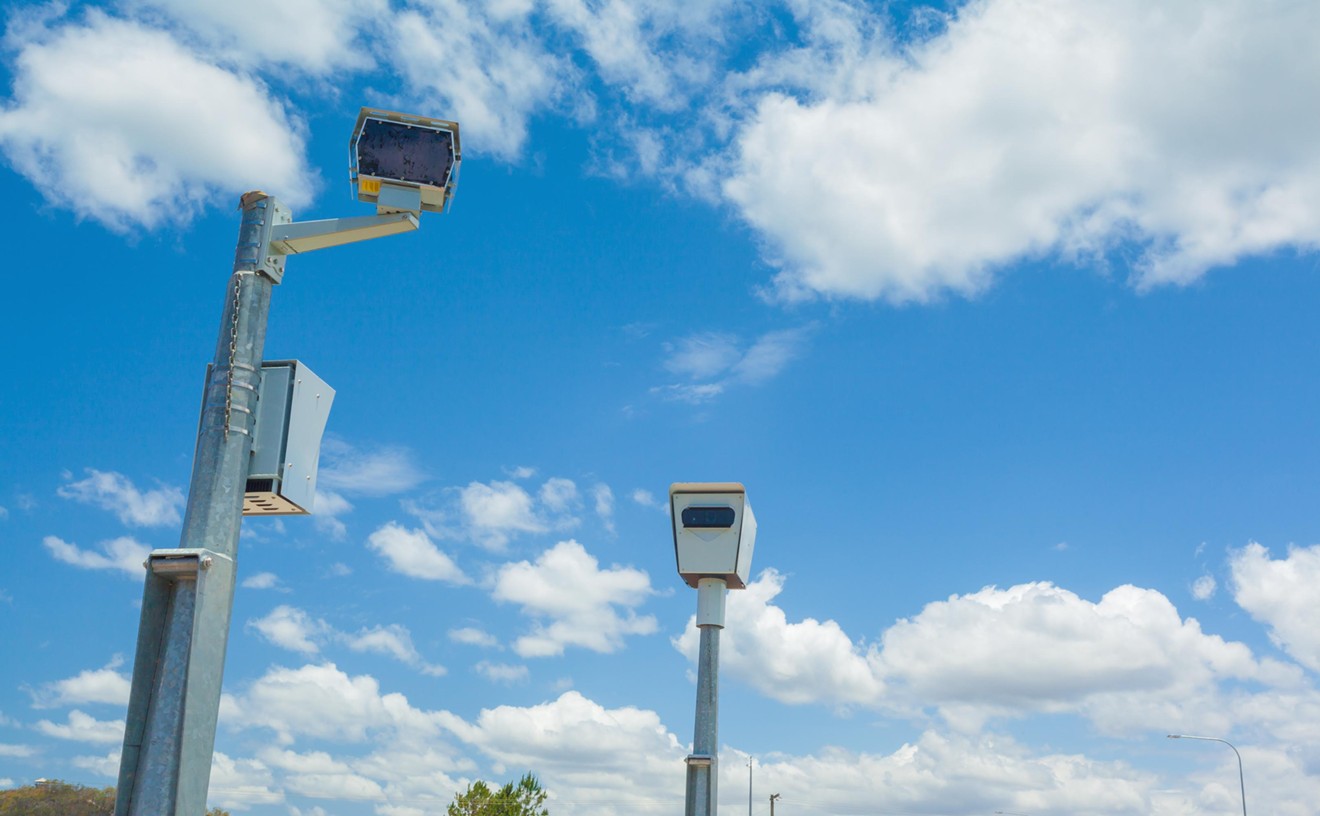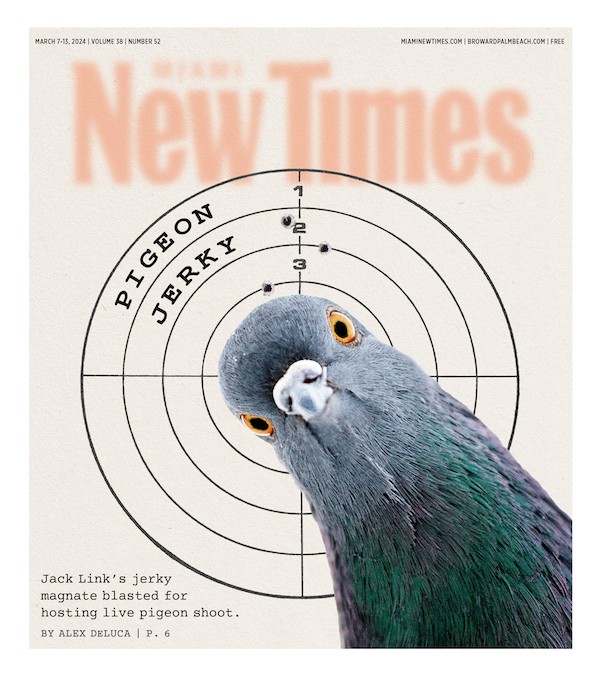- "Netflix's Griselda: What to Know About Miami's Queen of Cocaine"
- "Dead Giveaways That Netflix's Griselda Wasn't Shot in Miami"
- "Things Go Bitter With Coke: Netflix's Griselda Will Render You Uncomfortably Numb" (review)
- "Meet the Cocaine Queen" (2008)
- "Griselda Blanco, Miami's Cocaine Queen, Assassinated In Medellin Butcher Shop" (2012)
- "Griselda Blanco's Son Michael Corleone Still Faces Cocaine Trafficking Charge in Miami" (2012)
- "Who Was Griselda Blanco, the Miami Drug Queen Profiled in Lifetime's Cocaine Godmother?" (2018)
- "Griselda Blanco TV Movie Cocaine Godmother Is Campy and Sexist" (2018 review)
Nariz sat at a table inside the Dunkin' Donuts on Alton Road at 16th Street in Miami Beach. It was late afternoon this past May 12 as the fidgety 33-year-old Colombian waited for his new associate, a man we'll call "Rata," to show up. Nariz rubbed his bearded cleft chin and then his bird-beak nose that earned him his nickname. He wore shorts and a T-shirt exposing the tattoo on his right forearm that spelled Xtorxion, the name of his defunct record label.
His heavy brown eyes scanned the glass door. Unbeknownst to Nariz, a couple of investigators from the Drug Enforcement Administration were inside the coffee shop watching him. They were assisting the Sunrise Police Department vice squad, which had been keeping tabs on Nariz for two months. Rata had told the cops that Nariz was looking to score ten to 20 kilos on behalf of some rappers he knew.
During a recorded phone conversation earlier that day, Nariz had allegedly agreed to buy five bricks at $21,000 a kilo from Rata to kick off their relationship. Nariz informed Rata that he did not have the full amount to pay for the coke, so he offered the seller two pieces of collateral: the title to a 2009 Suzuki Hayabusa motorcycle, worth an estimated $10,000, and a shimmering white-gold necklace with a gigantic diamond-encrusted pendant that spelled out the letters T and S, the initials K.A.R., and the phrase Kill All Rats.
One of the vice squad detectives outfitted Rata with a hidden recording device and dropped him off at the coffee shop. Thirty-seven miles away in Sunrise, at a Shell gas station at 10300 W. Commercial Blvd., Nariz's buddy Abel Fernandez had a date with Rata's alleged partner, a beefy Hispanic undercover officer named Peña, who was also wired for sound.
After Fernandez received a text message from Nariz that Rata was at Dunkin' Donuts, he followed Peña to a warehouse at 4500 Hiatus Rd. Inside the warehouse, Fernandez unzipped a canvas bag containing $19,500 in cash, the motorcycle title, and the gaudy chain.
Peña, who brought his own bag with the five kilos, opened it and showed Fernandez a brick. Satisfied, Fernandez grabbed the coke and walked outside. Peña gave his squad mates the takedown signal. Fernandez was arrested before he could put the drugs inside the trunk of his Civic.
A few minutes later in Miami Beach, the DEA agents inside Dunkin' Donuts cuffed Nariz. As he listened to one of the cops read him his Miranda rights, Nariz may have fretted about what his mother might do: She's gonna kill me.
From the moment he was born on August 5, 1978, in Medellín until his mother was arrested on February 17, 1985, Michael Corleone Blanco, AKA "Nariz," was always by her side. During that time, Griselda Blanco, known as the Godmother of Cocaine, would solidify her reputation as the most ruthless narcotics queenpin in the early days of America's drug war.
La Madrina, as she was known by fellow traffickers and law enforcement, oversaw a billion-dollar criminal enterprise that moved approximately 3,400 pounds of cocaine a month in the United States. The DEA estimated she had 600 people on her payroll and had developed her own line of underwear with secret pockets that could hold one to two kilos of cocaine to sneak through customs, according to the nonfiction book Kings of Cocaine.
La Madrina broke the glass ceiling in the male-dominated underworld of the Colombian cartels by ruthlessly killing anyone who crossed her. She was accused of ordering at least 40 homicides from Miami to New York. Legend has it that Griselda is haunted by a body count that surpasses 250. From a very young age, Michael witnessed his mom's criminality.
Jorge "Rivi" Ayala, a former hit man who turned witness against Griselda, once told state prosecutors that in 1981 he accepted a $50,000 payment for killing a man for the Godmother while a then-3-year-old Michael was in the room. "He was there with his mommy and his daddy," Ayala testified.
Obsessed with the epic gangster film The Godfather and its sequel, Griselda named Michael after the movies' main character. La Madrina fantasized that her fourth and youngest son would follow a path similar to that of Vito Corleone's Mikey. Much like the movie's Genco Pura Olive Oil Company, Griselda's illicit corporation was a family affair. Her three oldest sons moved roughly 2,200 pounds of yayo in Miami, Los Angeles, and San Francisco. Michael was the heir apparent.
But it didn't turn out the way La Madrina had planned. Michael's father and older siblings were all killed before he reached adulthood. His mom was in prison for most of his childhood and teenage years, and he was raised by his maternal grandmother and legal guardians.
Griselda Blanco was released from prison in 2004 and deported to Colombia, where recent video footage of her exclusively shown to New Times reveals the Godmother, now a senior citizen, piddling around an empty house. Meanwhile, Michael had been leading a relatively anonymous suburban life until Miami-made documentary Cocaine Cowboys and its sequel turned Griselda into a cult antihero during the past decade.
Michael had avoided his mother's perilous path until now. Under the advice of his criminal defense lawyer, Michael declined to comment for this story.
New Times pieced together Michael's life through court documents and depositions from his mother's criminal cases, news articles and books about the Blanco family, Cocaine Cowboys footage, interviews Michael gave in 2008 to other media outlets, the criminal complaint against him, and extensive conversations with his childhood best friend and business manager, Cristian Rios. The result is a compelling tale about a young man struggling to debunk his mother's homicidal reputation while at the same time embracing her criminal legacy to capitalize on its entertainment value. "Michael is well aware of who he is in the public eye," says Cristian, who is convinced that Michael, who had inked a multimillion-dollar Hollywood deal six days before the bust, was set up. "He would not put his life in peril for something that would jeopardize his family, his movie deal, and his freedom."
One day in 1983, a 5-year-old Michael was in Medellín with his father, Dario Sepulveda, when their car was intercepted by men dressed as police officers. Griselda — also known as "the Black Widow" for having allegedly killed her first two husbands, one of whom had fathered her three eldest sons — had learned that her third hubby was messing around with a topless dancer from Fort Lauderdale. She confronted Dario about his infidelity inside the Davie home of Max Mermelstein, a smuggler who acted as point man for the cartel's distribution network.
The couple argued over Michael's custody. Dario preferred to send his son to school, but Griselda wanted Michael to be with her all the time, according to Mermelstein's account for a 1989 Sun-Sentinel article. (Mermelstein died in 2008 after being in the witness protection program.) So Dario took Michael to Colombia, where he thought his friends in the cartel, including kingpin Pablo Escobar and the Ochoa brothers, would protect him from his estranged wife.
The fake cops who intercepted Michael and his father opened fire on Dario, killing him. After the shooting, Mermelstein said, "Little Michael was screaming and ran over to embrace his father. But by the time he got there, Dario was dead."
Following his dad's murder, Michael was reunited with his mom in Miami. But Dario's friends and family members, including a brother who had been a hit man for Griselda, wanted revenge. Griselda never stayed in one place for long. She was constantly uprooting Michael from one hideout to another to stay one step ahead of her enemies and drug agents. She had safe houses in Miami, New York, Los Angeles, and the Bay Area.
When the Godmother and her sons fled to Irvine, California, the DEA ratcheted up its hunt. According to federal court documents, agents got a big break in 1984 when an old family friend named Gerry Gomez, who was doing a ten-year prison stint, volunteered to bring Griselda and her boys down. Gomez had owned a garage in Medellín where he had serviced cars and motorcycles owned by the Blancos.
Agents tracked down Griselda's house in Irvine. On the second day of surveillance, they spotted a 6-year-old Michael at the door. His mom was standing behind him. About 20 minutes later, six DEA detectives stormed the house. Michael watched as his mom was hauled off to jail. His brothers were subsequently arrested on trafficking charges. The Blancos' run had come to an end.
During the first five years his mother was incarcerated, Michael lived with his maternal grandmother. According to his friend Cristian, the boy had access to money and homes in Colombia that the U.S. government wasn't able to seize from his mother. When Griselda was sent to prison, Michael traveled back and forth between Medellín and the Bay Area, near the correctional facility where his mom was held. Sometimes he lived on his own. He would also seek out people to give him room and board.
In 2008, Michael told AllHipHop.com that from the time he was 12 until he reached adulthood, he was raised by various legal guardians whom he did not identify. "I would meet someone that my mother would know, and I would say, 'I'm going to live in your house and I'm going to pay you rent and you're going to be my legal guardian,'" Michael told the website. "At one point, the legal guardian happened to be a minister, and he taught me a lot about the Lord."
As the gatekeeper who guards entry into Michael's world, Cristian, a rakish chap with a scraggly beard and straight, shoulder-length black hair, confirms that account. "Michael was always searching for a familial atmosphere that he lacked," Cristian says. "He came away a better person because of those experiences. Michael would give a friend the shirt off his back. That's the man of substance he is."
During his late teen years, Michael experienced a bout of depression, Cristian adds. "His entire family was in prison. He didn't know what he was going to do with his life. He certainly wasn't accustomed to getting a 9-to-5 job. I told him to start writing down his memoir because someone would one day buy his story."
Cristian believes his friend is unfairly maligned because of Griselda's vicious criminal history.
"It's quite the Catch-22," Cristian says. "He loves his mother and he is very proud of her being his mom. But don't judge the kid based on his mother's past."
Michael was dressed in a black two-piece suit with a black shirt and shiny black loafers. A pair of black sunglasses topped off the mafioso attire he donned for the January 23, 2008 premiere of Cocaine Cowboys 2: Hustlin' With the Godmother at the Colony Theatre on Lincoln Road in Miami Beach. Cristian, similarly dressed, was by Michael's side. Griselda's scion joined the film's director, Billy Corben, and the star, Charles Cosby, on the red carpet to pose for photos.
Following the first Cocaine Cowboys, fans of the movie wanted to know more about Griselda. Corben and filmmaking partner Alfred Spellman decided to make a sequel that told the story of the bizarre business-minded sexual relationship Cosby cemented with La Madrina when she was serving time in a federal prison 20 miles outside his hometown of Oakland, California. The now-43-year-old had penned a charismatic fan letter to Griselda in 1991, when he was an ambitious crack-cocaine dealer in his early 20s looking to become a true kingpin. Cocaine Cowboys 2 shows how Cosby won the Godmother's heart and eventually earned her wrath. He claims he netted millions of dollars a month selling cocaine he obtained through Griselda, who was still brokering coke deals from behind bars.
Both flicks were produced without cooperation from Griselda or her family members. "We made several attempts to interview Griselda through her lawyer Nathan Diamond," Spellman says. "He declined."
Cosby met the Godmother's son around the time Michael claims he went to live with his first legal guardian. The youngest Blanco heir was residing in Morgan Hill near San Jose. Griselda's pen pal was struck by how much the boy resembled his mom. Indeed, Michael has Griselda's oval face, large nose, cleft chin, and coffee-colored eyes.
Michael would sleep over at Cosby's house in Oakland. "The Godmother definitely appreciated me spending so much quality time with Michael Corleone," Cosby recollects in Cocaine Cowboys 2. "It really scored a lot of points for me in her eyes."
Cosby described his bond with Michael in greater detail in a September 8, 1997 deposition in connection with her homicide charges. The pair would talk about his father and his uncle Paco, a hit man for his mother. Cosby also claimed a 15-year-old Michael gave him a MAC-10 machine gun as a present in 1993.
The street hustler made another startling revelation that he didn't share for the documentary. Under oath, Cosby recalled that before his first meeting with the Godmother, Michael knew Griselda wanted to give him kilos. "On the drive [to the prison], Michael mentioned that Griselda wanted to give us some coke so we could sell it together," Cosby testified. "I asked Michael, 'What do you think about it?' He said, 'I'm ready.'"
Michael's buddy and manager, Cristian, questioned Cosby's statements. "There is no denying the old lady's life was as serious as a heart attack," he asserts. "However, a lot of Cocaine Cowboys was made up for entertainment purposes."
Cristian also denies allegations that Griselda was a teenage prostitute after running away from her abusive mother, and he disputes Cosby's most outlandish claim — that in 1995 Griselda plotted to kidnap John F. Kennedy Jr. as a way to avoid murder charges in Miami. An FBI investigative report released after Kennedy's death in 1999 shows that agents were unable to corroborate the abduction threat.
Even though they had not seen each other in more than a decade, Cosby invited Michael to the sequel's world premiere. "People think there was bad blood between us," Cosby says. "But there is no ill will." Even though he was never 100 percent onboard with the Cocaine Cowboys franchise, Michael accepted the invitation.
"Michael was the white elephant in the theater," Cristian recalls. "Needless to say, he hated the movie. He didn't like that one brother's dead body was pictured onscreen or that his oldest brother is depicted torturing a guy. It was a little bit too much for Michael."
The psychological trauma of growing up with such violence can be devastating to a young child, says Maximillian Wachtel, a criminal forensic psychologist and professor at the University of Denver. "It's likely that he has developed depression or anxiety," Wachtel says. "His emotional trauma is very similar to what Iraq War veterans experience. He could even suffer from posttraumatic stress syndrome."
Wachtel also reasons that Michael's moral compass is probably stunted. "Now, can you imagine growing up knowing people call your mom the Black Widow?"
A few months after the premiere of Cocaine Cowboys 2, Michael sat in a chair on the set of Cristina Saralegui's Spanish-language talk show. Dressed in a khaki sports jacket, black slacks, and a black dress shirt, Michael was there to talk about his mom. In a soft baritone and thick Colombian accent, he spoke about a Griselda Blanco the world doesn't know. "My little old lady is someone who loves people," Michael said. "She has dedicated herself to God. She is a Christian. She lived through hell for the 24 years she was incarcerated."
He told Saralegui he was in show business, producing Latin hip-hop acts through his record label, Xtorxion, the name tattooed on his forearm. Michael also revealed he closed a deal with a Hollywood production company that plans to make a documentary and a feature-length movie about him and his mother with their full cooperation.
"Aren't you ashamed?" Saralegui asked him, prompting Michael to proclaim he had nothing to hang his head about.
"I will always support my mother," he said. "I don't care if she burned Rome to the ground. I will always defend her."
For much of the past three years, the supposedly publicity-averse Michael has been out and about embracing his legacy. In a two-minute video clip posted on his MySpace page, he emphatically introduces himself with the authority of a Sicilian mob boss as the "proudest son of the queen of cocaine." As he rides in the back seat of a car cruising Ocean Drive, Michael brags that Miami kids "were taught to get money. It's like a generational thing. It was built on cocaine. It was built on a culture of ruthlessness by people who loved money and a lavish lifestyle."
In his 2008 interview with AllHipHop.com, Michael described his mom as a Colombian June Cleaver. She would cook him breakfast, lunch, and dinner alongside the maids and tuck him in at night. She spoiled him with expensive gifts such as a Porsche golf cart on his sixth birthday.
He also acknowledged he knew his family was involved in illicit activities. "It was very easy to understand what was going around," Michael said. "I have witnessed certain events that I can't really talk about." When the interviewer asked Michael if he was ever tempted to deal cocaine, his response was a terse "no comment."
The task of informing Griselda that her youngest son had been arrested on cocaine trafficking and conspiracy charges fell to Cristian. "I thought she was going to hand me my fucking balls when I told her," Cristian remembers. "I felt like I let her down. Telling her what happened was like telling her Michael had been buried alive."
Sixteen minutes past 6 o'clock the evening of this past March 29, a gray two-door Honda pulled into a parking space outside the Ross Dress for Less at 12680 W. Sunrise Blvd. in Sunrise. Michael emerged from the driver's side to greet Rata, who had already notified Sunrise police vice detectives about Blanco's alleged interest in purchasing large quantities of cocaine. The wire-wearing snitch listened intently as Michael explained he was "brokering this cocaine deal on behalf of some rap artists." The rappers had "the money to purchase ten kilos of cocaine, but they were interested in purchasing up to 20 kilos."
Added Michael: "My people don't want to meet anybody. They just want me to conduct the transaction." After Rata negotiated a price of $21,000 per kilo, Michael said he would "talk to [his] people and get back in touch soon." The following day, at the Shell gas station on Commercial Boulevard, Michael told Rata that his "people were ready to conduct the transaction but are hesitant to bring the money out on the street."
Michael insisted the deal would go down but that it would take some time. As Sunrise narcotics cops and DEA agents monitored the conversation, Michael promised to remain in phone contact with Rata.
The investigation hit a wall until Michael called Rata two months later to buy the five kilos and arranged the Dunkin' Donuts meetup. When the bust finally went down, Michael invoked his Fifth Amendment right against self-incrimination, but his associate Abel Fernandez provided a taped, sworn statement to the cops. Fernandez told Detective Peña that Michael had promised to pay him $500 if he delivered the bag with the $19,000, the motorcycle title, and the medallion, a unique piece of jewelry that is worn exclusively by producers and rap artists from the independent record label Kill All Rats, a group loosely affiliated with Terror Squad, a clique of hip-hoppers led by Puerto Rican rapper Fat Joe and Miami radio personality DJ Khaled.
"Pistol" Pete Torres, Kill All Rats' chief executive, insists he has no idea how Michael got the chain or who he is.
"I wouldn't even know Michael Corleone Blanco if someone pointed him out," Torres says. The Bronx-born record label owner claims a couple of pendants were stolen years ago in New York. "I only know Colombian women," Torres quips. "I certainly don't know any guys doing funny shit. That's not where I am at. The name Kill All Rats is just meant to grab people's attention."
Michael's criminal defense attorney, Nathan Diamond, who also represented Griselda in the '90s, declined to comment about the Kill All Rats bauble or answer questions about his client and his mother. The circumstances under which Michael was busted surprised another star from the first Cocaine Cowboys doc. "If he is getting into his mom's line of work, that would be a bad idea," says Mickey Munday. "He had people around him that supposedly kept him in the right direction."
A tall and stocky 66-year-old with alabaster skin and a bouncy blond mane that cascades down his back, Munday used to be the stealthiest pilot to smuggle bales of Colombian marching powder into the United States between the late '70s and early '80s.
Munday says he never killed anyone, but in the film, one of his former associates described him as "MacGyver" for his innovative techniques for transporting cocaine without being detected by law enforcement. These days, Munday is trying his hand at spoken word, dropping verses about flying over the Bahamas with a few tons of coke and other smuggler odes.
Munday remembers meeting Michael for the first time at Steve's Pizza in North Miami in 2006 or 2007. "I never had anything to do with his mom," he says. "I never understood why everyone put up with her craziness." Michael and Mickey later participated in a photo shoot for a Nordic hip-hop magazine.
New Times asked Munday to give his opinion about Michael's arrest.
Reading the affidavit, Munday shakes his head in disbelief. "I'm totally surprised he would do something so stupid. It boggles my mind." The ex-smuggler claims he was always cautious of people wearing wires. "I'd meet you in a place with loud background music, and I'd talk real low so the bug couldn't pick up my voice," he says. "I would show up before the meet to see who was lurking around. Or I would move the meet to another location at the last minute so the cops don't have time to set up the surveillance equipment."
When Munday reads the part about the Kill All Rats medallion, he bursts out laughing. "That's pretty ironic," he says. "Where did he get that from? And why didn't the cops wait to see who he was going to take the kilos to? That makes me believe Michael is the guy they wanted, given his last name, especially since the DEA was involved."
Cristian puffs on a Marlboro Lights cigarette while searching for a video on his laptop computer. "I'm as close as you'll get to Michael," he says. Every media request goes through him, yet Cristian is very cryptic about how he came to know the Blancos. "I'm a childhood friend of the family," he says. "I'm also godfather to Michael's second son."
Cristian finds the clip, which he claims was recorded in 2009. "These are the most recent images of Griselda," he says. The footage shows him chatting with the Godmother, who sits on a stone bench in the back yard of one of her houses, overlooking a valley in Medellín. She is surrounded by members of a production crew that includes Eddy Moretti, the filmmaker behind documentaries Heavy Metal in Baghdad and Vice Guide to Travel. Moretti is conducting the first and only interview with Griselda since she was released from prison in 2004.
Cristian is also responsible for getting Michael on episodes of the telenovela Cartel de los Sapos and cable television show The Deadliest Warrior, whose premise is to pit one bad guy versus another bad guy to figure out who is the baddest.
The program's producers invited Michael to represent the Colombian cartel in a battle against Somali pirates to see who was tougher. In the episode, which aired last year, Michael blew up a car bomb that took out three dummies and the entire façade of a faux house in the middle of the Las Vegas desert. The producers, Cristian says, paid for Michael and his wife to fly to Sin City as well as their hotel accommodations. "Think of it as a second honeymoon," Cristian had told his friend.
Michael didn't like that the pirates beat the cartel, Cristian says. "That was a blow to Michael. You can't compare Somali pirates to the cartel."
In Cristian's video, the Godmother looks radiant for a woman in her late 60s. She sports a strawberry-blond up-do and soft pink lipstick to complement her subdued white pantsuit. She doesn't look the part of a notorious homicidal drug trafficker who was locked up for two decades.
(In 1998, Griselda was transferred from California federal prison to a Florida state correctional facility after pleading no contest to three counts of second-degree murder in Miami. Griselda would have faced the electric chair if the Miami-Dade State Attorney's Office hadn't bungled the case. Two of the prosecutor's secretaries were caught having phone sex with star witness and former Griselda button man Jorge Ayala. Upon her release in 2004, she was deported to Colombia.)
The video cuts to a room inside Griselda's home that features a large painting of her and her four kids. She sits on an ivory-hued sofa. The camera zooms in on her somber face as she watches a DVD Michael made for her. Michael shows off his wife, whom he married in 2005, and his two toddler sons. He is seen walking through the rooms of his house while giving Griselda a guided tour. "I love you, Mama," Michael says before signing off.
Moretti asks Griselda how she feels watching her only surviving son all grown up. "It makes me very sad," she says softly in Spanish. "I wish I could see him so I could hug him and kiss him. The most important part of my life are my sons."
Then Griselda walks around the exterior of her mountain villa, pointing out a barren spot where she plans to create a lush garden. Yet she has no one to share it with. Her three oldest boys were assassinated before she got out of prison. And she won't risk Michael's safety by having him visit her in their home country, where old enemies could be lying in wait.
She will likely never get the chance to chase her grandsons through a green patch like Vito Corleone did in his final scene of The Godfather.
Griselda looks directly at the camera. In a soft voice, she delivers Michael a message: "I love you. I can't wait to see you so I can bite your cheeks."
It's a sweltering afternoon on August 23, and Michael cautiously answers the front door of the two-story condo he and his wife rent in Southwest Miami-Dade. He is dressed in a white T-shirt and cream-colored jeans, which cover the electronic anklet that ensures he remains on house arrest. He invites a New Times reporter into his home for a brief conversation. "You had me spooked for a minute," he says.
His living room features finished wood floors and plain, off-white walls. The shades are drawn to keep snooping eyes at bay. Aside from a large flat-screen TV set, there is nothing extravagant about the furnishings. According to Miami-Dade public records, he has never taken out a mortgage or owned any property. He has never been sued either. Aside from getting ticketed seven times for traffic violations between 2003 and 2007, Michael has never been in real trouble with the law until this past May 12.
He has done a pretty good job of living a ghost-like existence. Michael skeptically glances at the reporter's business card. He says he would love to talk, but cites his lawyer's instructions. Then he adds, "I definitely have a lot of things I would like to get off my chest."

